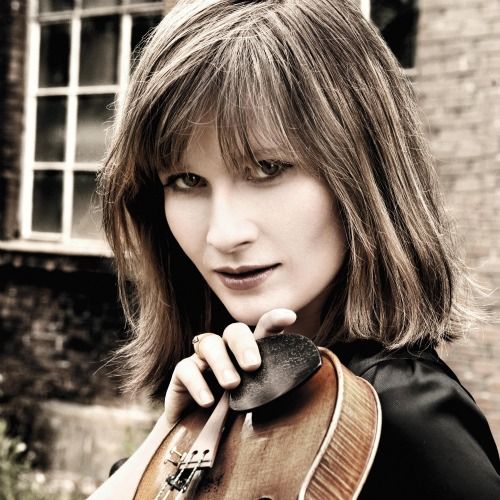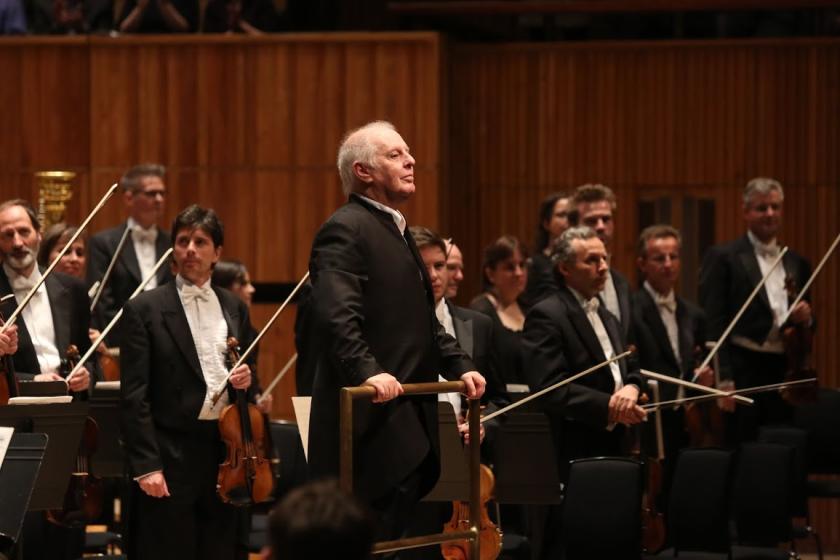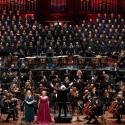Gasps of surprise were heard across the country last month, when Richard Morrison on BBC Radio 3's "Building a Library" announced Daniel Barenboim and the Staatskapelle Berlin as his library choice for Elgar’s Second Symphony. That recommendation proved timely for the conductor and his orchestra, who yesterday completed their short London residency with the same symphony. The performance demonstrated a genuine intimacy with Elgar’s music. Enthusiasm as well, perhaps to excess, with many cherished details overpowered. An evening of passionate music-making, though, with real emotional investment in every note.
Barenboim and the Berlin Staatskapelle make a good team. The sheer precision of their playing counts for much. It allows Barenboim to take risks, and to push dynamic and tempo extremes. He’s keen on contrasts, on sudden outbursts and punch chords that rip through the texture. Tempos are often outside the norm, particularly in the faster passages, and he will always make the most of an opportunity to build intensity and excitement through a driving accelerando. The balance to these potential excesses is the clear and precise playing of the orchestra, which usually maintains the textural clarity, and, more often than not, the poetry, even at these extremes.
 Violinist Lisa Batiashvili (pictured left by Anja Frers) is a similar sort of artist. She too pushes for drama and intensity, while always maintaining absolute clarity of articulation and line. Her tone is sinewy, a deep bronze colour, but not overly rich or weighty. That works well with the Staatskapelle strings, who have a similarly focused but light tone. Some tensions were apparent, though, between her and Barenboim in the Tchaikovsky Violin Concerto. Whenever the music in the first movement switched from solo to tutti, the tempo and dynamics got a huge and sudden boost, with the orchestra playing in full symphonic mode until the next solo, when it would abruptly move back to the soloist’s pace and scale. But Batiashvili brought magic to every movement, through the intensity of her focus in the first movement, her elegant grace in the second, and her tripping, rustic vitality in the folk dances of the finale.
Violinist Lisa Batiashvili (pictured left by Anja Frers) is a similar sort of artist. She too pushes for drama and intensity, while always maintaining absolute clarity of articulation and line. Her tone is sinewy, a deep bronze colour, but not overly rich or weighty. That works well with the Staatskapelle strings, who have a similarly focused but light tone. Some tensions were apparent, though, between her and Barenboim in the Tchaikovsky Violin Concerto. Whenever the music in the first movement switched from solo to tutti, the tempo and dynamics got a huge and sudden boost, with the orchestra playing in full symphonic mode until the next solo, when it would abruptly move back to the soloist’s pace and scale. But Batiashvili brought magic to every movement, through the intensity of her focus in the first movement, her elegant grace in the second, and her tripping, rustic vitality in the folk dances of the finale.
From the opening bars of the Elgar Second Symphony it was clear that Barenboim intended to continue on the same expansive scale. Tempos here were generally fast, and dynamics loud. The sheer exuberance of the orchestral playing in the opening was compelling. But this first movement didn’t all work. To balance the frenetic tuttis, Barenboim took the quieter passages right down to a whisper, and often a much slower tempo, as David Nice noted in the previous evening's performance of Strauss's Ein Heldenleben. That seemed to be so that he could create more contrast in the suddenly exploding tuttis, but the theatrics were often excessive. More of a problem was the woodwind’s inability to float the melodic lines at these slow tempos. Similar extremes of tempo and dynamics occurred in the second movement, which lacked nobility. There were some curious balance problems here: too much of the horns and too little of the trumpets, and the oboe obbligato was all but lost in the string textures.
Fortunately, the performance came together in the scherzo, and the finale too was excellent. The greatest virtue of the scherzo, ironically, was its moderation. By opening at a moderate tempo and dynamic, Barenboim was able to gradually build into the climaxes, and to create a sense of context for the extremes later on. Similarly in the finale, which opened with gorgeous playing form the cellos, here again at a reasonable pace and dynamic, from which the movement could grow. The quiet coda was very quiet, one final act of excess from Barenboim, but this time he was able to maintain the sense of line, and the long concluding chord was triumphant.
The evening ended with Barenboim being awarded the medal of the Elgar Society. The Royal Festival Hall was full to capacity, and from the applause it was clear that most were here for Barenboim. Ever the public speaker, he gave a moving acceptance speech, and when he concluded by paying tribute to “the one person who was the greatest Elgarian – she would have been 70 years old this year”, he had the entire audience in the palm of his hand.














Add comment